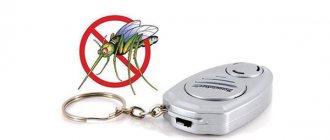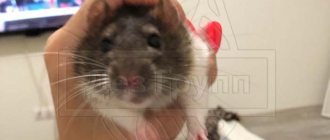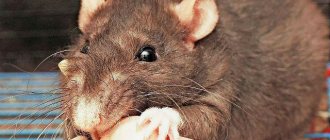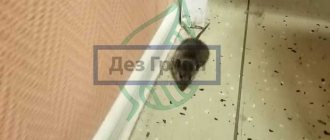What sounds do domestic and wild rats make?
Under natural conditions, rodents live in colonies and communicate in three complementary ways:
- High frequency sounds. Used by cubs to find their mother or by males during the mating season. The human ear is not able to recognize this signal.
- Chirping. Rapid rhythmic chattering of teeth is used to warn relatives of approaching danger. A domestic rat can also chirp if it is scared.
- Smells. They play a key role, since the rat’s sense of smell is more developed than other senses. Wild animals mark their territory with scent glands, and also recognize relatives by a specific smell.
Reference! Rats are myopic, so visual perception does not play a key role for them.
As they became domesticated, people learned to distinguish and identify some of the sounds of their pets.
What definitely won't repel rats?
Finally, it is almost certain that you will not be able to repel rats with the many cheap Chinese repellers that are actively sold on the Internet. In fact, these tools do nothing; often their task is simply to blink a light so that the user thinks that the device is working. They are bought in the hope of saving money and with the understanding that if the device does not help, then they will not mind the money spent. Actually, this is exactly what happens.
It is useful to pay attention to the operation of the repeller you are purchasing: if a device declared as ultrasonic clearly beeps, it means that it has nothing to do with ultrasound. Therefore, it is unlikely to drive rats out of the house. The so-called magnetic resonance and electromagnetic devices, which supposedly create a field in the electrical network of the apartment that repels insects and rodents, are also useless
There is no theoretical explanation for this effect, but in practice people find that rats and mice do not pay attention to such devices at all
The so-called magnetic resonance and electromagnetic devices, which supposedly create a field in the apartment’s electrical network that repels insects and rodents, are also useless. There is no theoretical explanation for this effect, but in practice people find that rats and mice do not pay attention to such devices at all.
Various folk repellents almost always turn out to be useless. For example:
- Elder;
- Broken glass scattered near rat passages;
- Black beans;
- Red pepper, also scattered near rat shelters;
- Ash;
- Singed fur;
- Burnt rubber...
At best, these drugs can cause some alertness in rats, but not for long. The animals quickly get used to it and do not leave the house.
If you have personal experience in repelling rodents from your home (by any means), be sure to share the information by leaving a review at the bottom of this page.
An example of how rodents do not pay any attention to a working repeller
- Choosing an effective electronic rat and mouse repeller
- Ultrasonic rat and mouse repeller Tornado 400 and reviews of its use
- The use of ultrasound against rats and mice
Squeak
With the help of a piercing loud squeak, the animal tries to convey its fear or pain. Inspect the area around the cage and analyze what might have frightened your pet. It is likely that the rat could hear the cat or the hum of the vacuum cleaner from the next room.
If the rat does not live alone in the cage, put it away. Inspect carefully for bites and injuries. If there are no visible signs of damage on the body, and the pet does not calm down and continues to squeak for a long time, contact your veterinarian immediately. Your pet may experience severe pain due to internal injuries.
A quiet, barely audible squeak from stroking means that the rodent enjoys communicating with the owner.
An abrupt loud squeak when pulled out of the cage signals that the pet is not in the mood to contact a person.
Coughing and sneezing - is the rat sick?
The vast majority of rats rarely cough. However, their cough is usually a consequence of shortness of breath or difficulty breathing. Some rats cough when they are choking, which often causes them to jump back and forth. This causes their throat to feel sore, so they may choke if they eat too quickly. Therefore, the rat needs to be taken to a veterinarian for an examination.
Decorative sphinx rat is sick
Some rodents may also sneeze. This happens for a variety of reasons. So let's look at some of the most common cases.
- Rat sneezing due to illness
Constant sneezing is often a sign of illness. If this is the case, you will notice symptoms such as poor appetite, changes in activity, wheezing, and discharge from the nose and eyes. These accompanying symptoms are usually accompanied by general weakness or discomfort.
- Sneezing caused by allergies
Many rats are prone to developing allergies under certain circumstances, so this shouldn't surprise you. How to recognize this?
Just like humans, rats can have different allergic reactions to different things in their environment.
When rats have allergies, they sneeze at different times quite often. If your pet recently started sneezing, and you recently changed his bedding, food, or added new items to his rat cage, they most likely caused the allergy.
- Sneezing due to new scented oils, candles, air fresheners and pets
All of these can cause sneezing. A new animal, such as a dog or cat, can cause a similar reaction when introduced into a rat's environment. While rodents may quickly become accustomed to new animals in the home, they may never become accustomed to these odors in the air.
The same goes for air fresheners, oil warmers, oil diffusers, candles, incense and wax melts. All of these can irritate the rat's respiratory system and make it feel nauseous. But not all rodents are easily irritated.
Essential oil diffusers are growing in popularity these days. Although they may have therapeutic effects on people, be careful when distributing these oils. They are not recommended because the respiratory system of pet rats is quite fragile, which increases the risk of adverse reactions.
Can pet rats hiccup?
Hiccups in an animal occur against the background of:
- overeating;
- nervous excitement;
- hypothermia;
- helminthic infestation.
If the case of hiccups is isolated, then there is no need to worry - perhaps the rat has simply eaten too much. If attacks of hiccups occur periodically, then you need to think about changing food and carrying out preventive deworming.
Important! When hiccups are accompanied by heavy, wheezing breathing, take your pet to the vet immediately. There is a high risk of pneumonia or pneumonia. Without proper treatment, this can lead to the death of your pet.
Tips to help you understand the decorative rat
So, we have established that character is an individual characteristic of each individual. However, there are little clues that can help you understand any and all ornamental rats, even the sphinx rat. These clues are some common behaviors that, once you learn to recognize, will help you understand your rodent without words.
Why does a rat lick its owner's fingers or hair?
A person who is far from keeping such rodents at home will not think long about the answer to this question. Yes, she's just hungry and wants to eat you. But that's not true. The fact is that rats are very social and public pets.
And, if Djungarian hamsters are rather self-sufficient creatures that simply tolerate your company and your attention, then decorative rats, on the contrary, enjoy your attention and your touches, and in order to somehow express their gratitude to you - they try to lick your fingers and hair. This rat “grooming” reminds them of childhood and maternal affection, and in such a situation, they show you that they treat you as tenderly and affectionately as a mother treats her cubs
This is exactly how they show their care to us.
The same can be said about situations when you watch rats lick each other, stroke each other’s tails, noses, ears...
Considering this peculiarity of the behavior of rats, if you cannot give your rodent enough attention, so that he does not die from melancholy and loneliness, which rats tolerate very poorly, it is recommended to get him a mate with whom he can fully realize his needs in communication. Well, you will definitely enjoy watching how decorative rats sleep in an embrace, play and playfully fight... Read more about breeding decorative rats at home.
Why does a rat grind its teeth?
Wary behavior of a decorative rat
You can often hear owners of decorative rats say that their pet periodically grinds its teeth. Most often this happens when you pick up a rodent and it sits on your shoulder, however, a similar squeak can be heard under other circumstances. What does it mean? Does the rat express dissatisfaction in this way, or, on the contrary, show how happy it is? In order to characterize the hidden meaning of teeth grinding in rats, we invite you to remember why cats purr. In this way, your pet shows you how happy and glad he is that he has you, that you feed him and take care of him. During such a squeak, a vibration occurs that passes through the entire body of the decorative rat, and it may even begin to tremble with joy.
However, if a rat does not just grind its teeth with happiness, but clicks them, then this is already a state of excitement and excitement. Something scared or interested your pet, and if he could talk, he would definitely tell you about it.
If the clicking of the teeth is accompanied by such signs as the fur on the back standing on end, tension throughout the body, the shine of the eyes, while the rat looks, staring at one point, then this is already a strong excitement, caused by an emotion of a negative nature. If the hissing and squealing sounds that the rodent makes are added to the picture described above, then it is preparing for an attack.
What sounds indicate health problems?
“Pigeon” cooing occurs with various diseases of the respiratory system (colds, rhinitis, runny nose), less often with cardiac dysfunction. The animal needs a veterinary examination and selection of comprehensive treatment.
Grunting sounds can be a sign of a deviated nasal septum, rhinitis, or even pneumonia. But don’t be alarmed in advance—in some cases, the rat may grunt with pleasure. For example, receiving a desired treat or affection from a person.
Can you use a computer or phone to repel rats?
A logical thought may come to the mind of a modern active user of electronic gadgets: should we try to scare away rats with a sound recorded on a phone or computer?
In fact, this idea is not new, but it has already failed several times. First of all, because the speakers of most devices “for people” are not designed to reproduce ultrasound. And not only the speakers, but also the electronic part itself (the amplifier) is not designed for such frequencies.
In addition, the power of the speakers of mobile devices leaves much to be desired. The “ultrasonic” squeak from them will practically not be heard at the end of a medium-sized room.
However, the sounds supposedly repelling rats from the house have already been recorded on mp3. Just for fun, you can download them and try to play them on your phone:
Another version of the scaring sound (20,000 Hz)
Just remember that it is ultrasound that scares rats, which the human ear cannot perceive. This means that if a clearly audible squeak is recorded in an mp3, then there is practically no hope for it.
On a note
For those who like to experiment, today an application for the phone (smartphone) has even been developed, which is called “Rat Repeller”. This program not only generates sounds, but also changes their frequencies.
Can a rat scream?
A heart-rending squeal, scream, or, as it is also called, “crying” of a rat is a sign that the animal is very scared or in pain.
If there are no objective reasons for panic, and the pet continues to scream, carefully remove it from the cage and feel its body with your finger. As a rule, when a person touches a sore spot, the rodent begins to scream louder.
Note! In some cases, a rat may experience pain due to internal injuries to the esophagus after eating inappropriate foods.
Causes of laughter in rats
Just like humans, rats react to tickling. This is due to neurons that have been identified in the brain of rats; they are responsible for the reaction to tickling in the form of laughter. Like in humans, they are located in the frontal lobes, which are responsible for mood (thanks to these same zones, the animal senses its body in space).
By tickling the paw (similar to a human foot), belly or behind the ears, you can make the animal smile or laugh. The animal gets pleasure and makes sounds that are very reminiscent of a person’s fervent laughter, and a satisfied grimace appears on its face.
To provoke laughter, you need to gently tickle:
- paws
- abdomen
- behind the ear
- withers
As evidence that rats experience positive emotions, the following is noted: after being tickled, the animal reaches out again to be tickled and looks forward to the owner playing with it again.
The approaching hand of a person during games brings a smile to the face; this is due to the developed intelligence of these rodents, which are able to remember and evaluate cause-and-effect relationships.
But not only by irritating sensitive areas, you can cause a smile and laughter. Studies have been conducted to determine whether rats can actually laugh and smile during positive emotions. The research was successful, and it was found that rats laugh while playing with their relatives, as well as when observing funny situations in the pack.
Surprisingly, scientists say that the female will choose as a partner the individual who laughs and does it more often than other candidates.
It is also believed that young individuals laugh more often. The laughter of rats is compared to the laughter of children; even their tickling zones (neck/withers) are the same.
In addition to laughter, rats can make other sound signals:
- A prolonged squeak, reminiscent of a scream - if you hear such a sound from your pet, it can indicate severe pain. In this case, inspect your animal for damage; it may have been injured. If there are no visible wounds, contact your veterinarian for help.
- Hoarse sounds - this is how the animal shows its aggressive attitude and tries to scare away a possible enemy. At these moments it is better not to touch the animal.
- Hissing or tremor of teeth also indicates a hostile attitude of the animal.
- Squeaking or short hissing sounds can indicate the animal’s readiness for mating; such sounds can be heard during mating games, between a female and a male.
It is worth paying attention to the following sound signals:
- Coughing or sneezing - this may indicate your pet has a cold; it is advisable to visit a veterinarian for an examination.
- Licking the owner's hands indicates a good attitude.
- Squeaking during touch - the tone of the sound indicates positive emotions, or pain.
- Grinding of teeth may indicate that the animal is experiencing positive emotions.
- Wheezing – may indicate difficulty breathing, for example if the animal has a cold. It is much worse if the wheezing occurs due to suffocation, for example if the animal choked on food.
It is very important to observe the pet’s behavior and be able to distinguish their sound signals in order to provide the necessary assistance and help the pet, or, on the contrary, not to touch it if the animal is passionate about its activities.
What sound does a wounded animal make?
May scream, chirp, or remain silent due to painful shock. Most often, domestic rats suffer injuries to their paws: a torn claw, a cut, a splinter, a broken toe or tail, or a pinched tail.
If you find that your pet has injured itself, calm down, don’t panic, give it first aid. Treat the wound with an anti-inflammatory agent. Try to stop the bleeding with hydrogen peroxide.
Various methods of repelling mice
All rodents cannot tolerate loud sounds and noises. You can scare away annoying mice and rats as follows:
- Sometimes you can scare away rodents by tapping on those places where you can feel their presence: you can hear squeaking and fussing. If you tap for several days, it is likely that the rodents will go to a quiet place.
- If rodents have infested in large numbers in cellars, basements, sheds, then in this case you can use sound-reproducing equipment by turning the volume up to high power. After such short “discos” held for several days in a row, mice usually leave these premises.
- You can use an old washing machine. Small metal objects are placed in its drum: bolts, spoons. The machine switches on to spin mode. This repeller produces an unpleasant metallic sound, so it can be used in remote sheds and garages.
- Rodents are active carriers of infection. Back in the old days, to prevent the development of epidemics, people rang church bells. The bell ringing contains an ultrasonic component that repels rodents.
- Some modern devices imitate sounds that repel mice. They can imitate the meow of a cat, the calls of birds of prey and the sound of their wings. But mice quickly recognize the deception and stop responding to such sounds.
- Devices that produce a squeak from the dominant male have proven themselves well. In the fall, when a massive invasion of mice from the fields begins, this squeak makes it clear that the wintering place has already been occupied.
The rat makes strange noises: what should I do?
Sounds that are unusual for humans are not always something unnatural. Sometimes a rat tries to attract attention, get a treat, or announce danger in this way. Guided by the description of each sound, you can easily understand what your pet is trying to say.
If you suspect that the animal is unwell and needs medical attention, do not delay visiting the veterinarian.
It’s not difficult to learn to feel your pet’s mood if you give him a couple of hours of free time every day. Follow the habits of the rat, try to understand the logic of its actions. Then you will easily understand the sounds that the rat makes and what it is trying to communicate to you in this way.
Great article 26
Meaning of beeps
How does a rat squeak? - extremely diverse. The rather rich tongue of a rodent signals that the animal is afraid, in pain, indignant, happy at the appearance of its owner, etc. The only way for a pet to express its emotions is through sound signals.
In order to know why a rat squeaks, every attentive owner must learn to decipher the sounds made by the pet:
- If a rat screams for a long time or squeals heart-rendingly , it means that it is in great pain. It is necessary to examine the animal and identify the cause of the pain, be it damage from a sharp object or a wound received in a fight with a fellow animal. If there are no external wounds, you need to seek the help of a veterinarian - the internal organs of the rodent may be damaged;
- if the owner hears a hoarse squeak , then the animal is either angry or aggressive. As a rule, such a signal is aimed at intimidating the opponent. At this time, the rat is unlikely to like being disturbed, so you need to give it time to “cool down” and calm down;
- if the animal hisses , then this is also a signal of aggression and hostility. Most likely, it declares to its fellows its territorial rights or the rights to mate with the chosen female;
- if an animal chirps , then it is probably scared and warns community members about potential danger;
- but the pet grunts because it rejoices and experiences complete satisfaction;
- From the same positive emotions, a rodent can grind its teeth ;
If your pet rat squeaks strangely, either coughing or sneezing, it most likely has a cold and the animal needs treatment. In this case, be sure to show the animal to the veterinarian.
Related article: Can rats laugh? Video of a laughing rat
Electronic devices for repelling rodents
Industrial ultrasonic repellers produce sound with a frequency of more than 32 kHz.
This sound is perfectly perceived by rodents, but humans cannot hear it. The first ultrasonic repellers operated at a constant frequency, but mice and rats adapted to them over time. Modern devices use the floating frequency principle, to which rodents cannot adapt. The main disadvantage of ultrasonic repellers is that ultrasonic vibrations in apartments are strongly absorbed by walls and ceilings, and upholstered furniture. One device usually provides protection over an area of 30-40 m². Therefore, to fully protect the apartment, they need to be installed in every room.
Many manufacturers of electronic repellers claim that their devices are safe for people and pets. But this issue has not yet been fully studied. In some Western European countries, the production and sale of such devices is prohibited.
Practice has shown that electronic repellers will be effective if they are used in conjunction with other means of rodent control.
Checking whether a device works and how effective it is is quite difficult. Usually, sellers and buyers in markets check the performance of only one fact: whether the indicator light is on or off. In fact, it may turn out that there is nothing else in it except the body of the device and the indicator. Therefore, you need to purchase repellent devices only in specialized stores or from official representatives.











